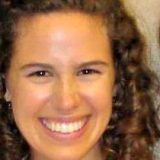This week, we debrief with Phylisa, a 27-year-old public policy professional who recently moved to Jamaica Plain from London via her home state of California. She also blogs for The Date Report.

When I arrived in Boston at 6:20 a.m. last Christmas Day, I thought I’d be staying for a maximum of three months. I had just moved back to the States after living in London for four years. One of my oldest, dearest friends and her partner offered me a small room in their apartment for a modest price, for however long I needed it, as a landing dock while I made plans. My boyfriend was going to join me in the States after finishing his last few months in Europe, and we planned to relocate to San Francisco. I knew approximately three people in the city, had only one “coat,” and was completely unprepared for the massive shift about to happen in my life.
In January, my relationship went through a wretched dissolution, and I was left heartbroken. Nothing could have prepared me for the heaviness of the pain that came with this betrayal, especially considering that I’d just left my home of four years, my job and friends. I was not surprised by the ways in which my friends and family from all over the world rallied around me. What really shocked me was the outpouring of care, acceptance and support I received from my brand-new Bostonian neighbors.
My new roommates were incredible, taking shifts laying on the floor with me and preparing my favorite foods. They lured me out of the house with invitations to Shabbat dinners, parties and brunches with their friends. After only a few weeks, my name was on the list of invite-regulars.
Unlike my more diverse friend groups in London, this community was mostly Jewish and mostly queer. It would be a massive oversimplification to attribute my new community’s openness solely to the specific identities of the people in it. First of all, there isn’t a common identity. Second, members of this community are individually incredible. The whole is truly the sum of its parts. However, there is something particularly warm and familial about being invited to Shabbat dinner to sit around a candlelit table with likeminded people and food and wine, doing what our families have done for generations.
The idea of joining a sorority or networking group never occurred to me; I’ve always been good at making friends. I’ve joked that because I’m Jewish, I have a network wherever I go already, whether I want one or not: “Look David up. He was my cousin’s high school boyfriend. He’ll look after you.” Even if I didn’t want to look up David, I would anyway to appease whomever, because that’s what we do.
As my years in my youth group have become more distant, I have become less and less religious. I feared that investing in relationships with this close-knit, young, passionate, progressive Jewish community in Boston was misleading and that as they got to know me they’d realize that I wasn’t Jewish enough or they’d resent my lack of Jewish practice. To the contrary, this community was nothing but loving, open and happy to throw their collective arms around me. No one in this community expects that because I’m Jewish, I will do or be X, Y or Z, and, perhaps ironically, that makes me feel much more a part of it, on whichever terms I choose.
The cultural openness of generations of Jewish communities has never been clearer to me than in this past year in Boston; we learned it from our parents and grandparents. It goes without saying that one doesn’t have to be Jewish to be a part of a close-knit, loving community, and not all Jews are. But I remain deeply moved by the unconditional support my neighbors gave me during this period of heartbreak, and how I was given almost no choice but to let them take me in after knowing them a mere few weeks.
“I’m too British for this now,” I told them. “All of these feelings are overwhelming me!” But I was wrong. I was raw—completely exposed—and I desperately needed the openness that was being offered to me. “Hineni,” I kept thinking. “I am here,” they said.
There is no question in my mind that my life today would look very different if I hadn’t landed in Jamaica Plain. No matter where I end up, Boston will always be a home to me, due in no small part to my incredible community. I hope, for the sake of other wayward lay Jews across the country, that similar pockets exist elsewhere. But I know there is certainly no place like this.
What gets you through a breakup? How do you cope with the ups and downs of hope and heartache? Let’s debrief. Send your stories and strategies to mimia@jewishboston.com.
This post has been contributed by a third party. The opinions, facts and any media content are presented solely by the author, and JewishBoston assumes no responsibility for them. Want to add your voice to the conversation? Publish your own post here. MORE


